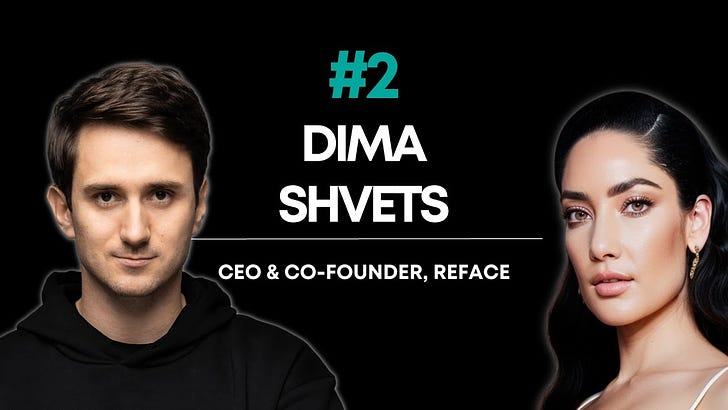PIONEER: The (Gen)AI-powered Internet with Dima Shvets
The CEO and Co-Founder of Reface on surviving an invasion and the future of AI-powered content
Hello all,
Just in time for the weekend, I bring you my interview with Dima Shvets, the CEO and Co-Founder of Reface. Dima and I have been speaking for a few years: he is one of the earliest pioneers in the space, launching Reface’s wildly successful app in January 2020.
In three to five years, the majority of the content which people interact with, or create, or distribute will be synthetically or artificially generated.
Dima Shvets, CEO, Reface
The Reface app was the first time consumers could play with AI-generated content: in this case, ‘face swaps,’ or swapping one face for another in a piece of media. (For instance, switching your face onto Neo’s in an iconic Matrix scene.)
While a face swap seems basic to what is possible today — at the time — it was mindblowing — almost magical. Moreover, the fact that this could be done on a mobile device was unprecedented.
Within months — Reface had 100 million installations, was the number one app in the US App Store and was named the App of the Year in Google Play. From Snoop Dogg to Miley Cyrus and Justin Bieber — everyone was using Reface. Even Elon Musk. In terms of capturing the zeitgeist, this was the precursor to ChatGPT.
The launch of Reface set in motion several trends around AI-generated content that are now rapidly accelerating.
The democratisation of AI-powered content creation: Everything from Reface to Midjourney to ChatGPT is part of the same continuum of democratising content creation. I predict that hundreds of millions — even billions — of people will interact and make content with the help of AI this year.
The hyper-personalisation of content: What started as a face swap is evolving into the hyper-personalised content of the future. I spoke to a content creator this week who told me he spent five days filming a hundred bespoke messages for his fans a decade ago. Thanks to AI, that is no longer necessary. Content can be hyper-personalised and this can be done at scale.
The explosion of synthetic content: When Reface launched, an estimated 10,000 pieces of synthetic content existed. Today, users of Reface have generated over six billion (!) pieces of synthetic content on the app alone. These exponentials are why I predict that up to 90% of online content could be AI-generated by 2025.
And so Dima and his co-founders — three friends from Kyiv who’d been ‘playing around with AI’ — helped change the future trajectory of content creation forever.
I also found it simultaneously heartbreaking and inspiring to hear how Dima’s burgeoning start-up (HQ’ed in Kyiv) found itself on the front line of the Russian invasion a year ago. But, just like the people of Ukraine, and despite everything — they carry on.
In this episode, we cover:
The evolution of GenAI content-creation from deepfakes and face swaps
The immense popularity of Reface the App (250m downloads)
The coming explosion of synthetic content: 10K pieces when Reface started to 6bn created on Reface's app today.
Generative AI as a new medium of human creativity and digital self-expression
Running a start-up caught in the front line of an invasion (Reface is a Ukrainian company)
Why the market is ready for mass adoption of Generative AI
The evolution of foundational Generative AI models (and foundational models vs local models)
The democratisation and accessibility of Generative AI through open-source collaboration
Foundational models vs local models
Open source GenAI as an antidote to tech monopolies, and if open source compete with big tech?
Why this is an excellent time for AI (and to start an AI company)
The emergence of an 'application' layer for GenAI
Why regulation and authentication will help lead to mass adoption
Enjoy.
Ps - You’re in for a double dose of content this weekend. Henry and I will be back breaking down the week in GenAI: everything from ‘AI on trial’ to Nick Cave’s dismissal of ChatGPT.
Stayed tuned. And for now…
Namaste and goodnight.
Nina






